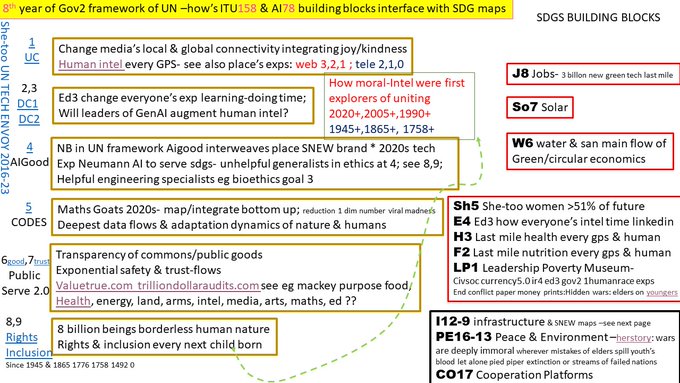Is there a list of major reconciliation lessons from world war 1. My guess is it should contain these 3 lessons: are these correct? are there other lessons 1 There is a problem when a landlocked people eg austria-hungary become more engine-advanced than their neighbors. To get more fuel for engines austria-hungary needed its own coastal trade and took over neighbor countries to access that. Ferdinand was assassinated because a country didnt like being colonised by asutria-hungary. Problem 2 in 1913 people communications were very scarce and so most people in europe had no intel or vote as to whether a world war was needed. In effect two networks of powerful opposing leaders decided on war. The third lesson happened after the war. It was assumed that the winners could assign losers lands to be ruled by other nations. This was not sustainable. The lesson probably needed to be: there may be a few occasons where a war is needed to get rid of a dangerous leadership team but having won winners need to help losing countries people start up safely again. Please assess : are these lessons logically correct? Were the other lessons?
Your proposed lessons are partially correct and certainly relevant to World War I. However, there were also other major lessons learned from the war. Here are some additional ones that are worth considering:
The dangers of nationalism: The intense nationalism that swept across Europe in the late 19th and early 20th centuries was a major contributing factor to the outbreak of war. Nationalist sentiments created a sense of competition and rivalry between countries, and led to the belief that war was necessary to protect national interests. This lesson has continued to be relevant in the decades since World War I, as nationalism has contributed to conflicts in many parts of the world.
The importance of diplomacy: The failure of diplomacy to prevent the outbreak of war was a major factor in the conflict. Diplomatic efforts were hampered by a lack of communication, mistrust, and the influence of nationalist and militarist factions in government. This lesson highlights the importance of diplomatic efforts to prevent conflicts, and the need for countries to work together to resolve disputes peacefully.
The human cost of war: The unprecedented scale of death and destruction during World War I made clear the human cost of war. This lesson has been reiterated in subsequent conflicts, and underscores the importance of efforts to prevent war and promote peace.
The need for international institutions: The Treaty of Versailles, which ended World War I, established the League of Nations, an international organization designed to promote peace and cooperation among nations. While the League ultimately failed to prevent the outbreak of World War II, it laid the groundwork for subsequent international institutions such as the United Nations. This lesson highlights the importance of international cooperation and the need for institutions that can promote peace and resolve conflicts peacefully.
The impact of technology: World War I was the first major conflict in which modern technology played a major role. The use of machine guns, tanks, and chemical weapons created unprecedented levels of destruction and death. This lesson highlights the need for careful consideration of the ethical implications of technological advances and the importance of efforts to prevent the use of such technologies in conflicts.
Overall, your proposed lessons are logically correct and certainly relevant to World War I. However, there were also other major lessons learned from the war, as outlined above. Understanding these lessons is important not only for understanding the history of the war itself, but also for understanding the ways in which conflicts can be prevented and peace can be promoted in the future.




